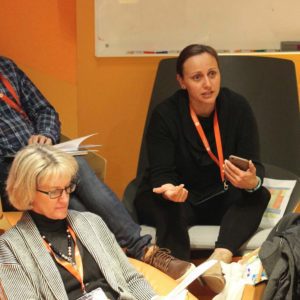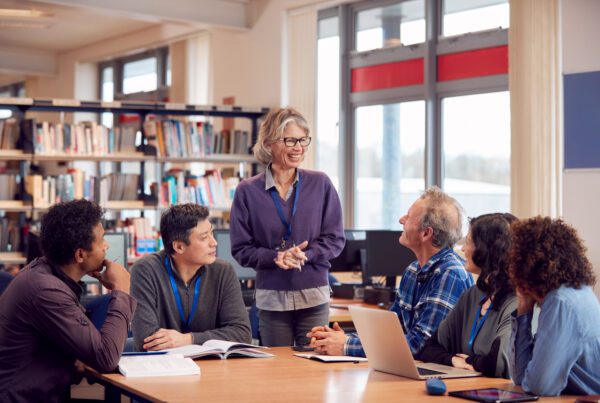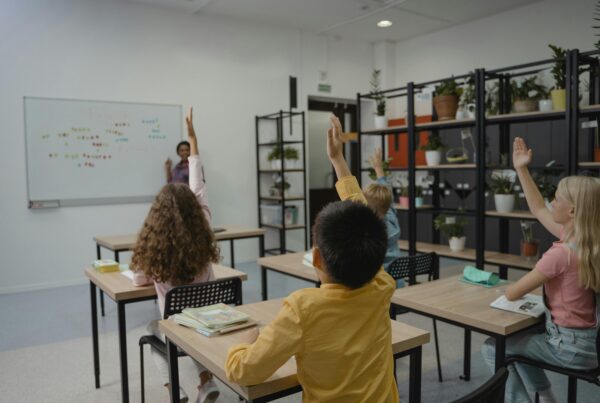What is professional learning for teachers?
Professional learning (PL) for teachers refers to the ongoing process of acquiring and developing knowledge, skills, and competencies relevant to their teaching profession. It involves activities, programs, and experiences designed to enhance educators’ understanding and effectiveness in their roles. It is subtly different from professional development (PD), which often refers to a more structured process or activities that teachers engage in. Whilst we certainly see plenty of activity in EC Premium that would fit under the definition of PD, we often find ourselves using PL more and embracing the wide spectrum of ways that educators can continually learn.

Professional learning recognises that teaching is a dynamic field, constantly evolving with new research, methodologies, technologies, and educational trends. Therefore, teachers engage in continuous learning to stay updated with best practices and continually improve the instruction they can offer their students.
Some ways that professional learning can take place across the career of a teacher include:
- Content Knowledge: Professional learning aims to deepen teachers’ subject matter knowledge in the areas they teach. It helps them to stay current with the latest research, theories, and practices related to their disciplines. In EC Premium we constantly strive to bring new learning content related to specific subjects to support this.
- Pedagogical Strategies: Teachers explore and refine instructional techniques, teaching methods, and classroom management strategies to meet the diverse needs of their students. Educators can pick up and refine approaches in a range of ways, through online learning, workshops, professional learning communities, conversations in the staff room and classroom observations.
- Collaboration and Networking: Professional learning often involves collaboration among teachers. It can take the form of professional learning communities, where educators come together to share ideas, discuss challenges, and learn from each other’s experiences. Networking with colleagues and experts in the field also provides opportunities for growth and development. We’ve deliberately built out the ‘groups’ functionality in EC Premium to support this and allow educators to share learning that they find exciting, challenging, and useful.
- Reflective Practice: Teachers can engage in reflective practice, critically analysing their teaching methods, classroom interactions, and student outcomes. With reflective practices, they can evaluate their own performance, identify areas for improvement, and implement strategies to enhance their teaching effectiveness.
- Technology Integration: Given the increasing role of technology in education, teachers can engage in professional learning designed to help them integrate technology tools and resources into their instructional practices. This helps them leverage technology for student engagement, personalised learning, and assessment. We are proud to have Microsoft as a content partner and share their Microsoft Learn for Educators content from our EC Premium portals.
- Professional Development Programs: Educational institutions and organisations offer various professional development programs and workshops tailored to teachers’ needs. These programs might focus on specific subjects, instructional approaches, assessment strategies, or leadership development.
- Continuing Education: Teachers participate in continuing education courses, workshops, conferences, and seminars to expand their knowledge and skills. These activities often provide opportunities to earn professional development credits or certifications, either through postgraduate diploma and master’s programs or, increasingly, through micro-credentials.
- Mentoring and Coaching: Experienced educators may provide mentoring or coaching support to less-experienced teachers. Mentors offer guidance, feedback, and support, helping new teachers navigate the challenges of the profession and refine their instructional practices.
- Research and Educational Literature: Engaging with educational research, literature, and publications allows teachers to access current information and evidence-based practices. It helps them make informed decisions and incorporate research findings into their teaching. One of the most popular content partners in our library for this work is Kim Marshall with his Marshall Memo. To produce the Marshall Memo, Kim subscribes to scores of carefully-chosen publications and every Sunday reads through the 150 or so articles that arrived that week and selects 8-10 that have the greatest potential to improve teaching, leadership, and learning. The Marshall Memo, published 50 times a year since 2003, is designed to keep principals, teachers, instructional coaches, superintendents, and other PreK-12 educators well-informed on current research and best practices.
Professional learning for teachers is crucial to ensure the continuous improvement of their instructional practices, promote student achievement, and respond effectively to the evolving needs of education. It empowers teachers as lifelong learners and contributes to their professional growth and development.




